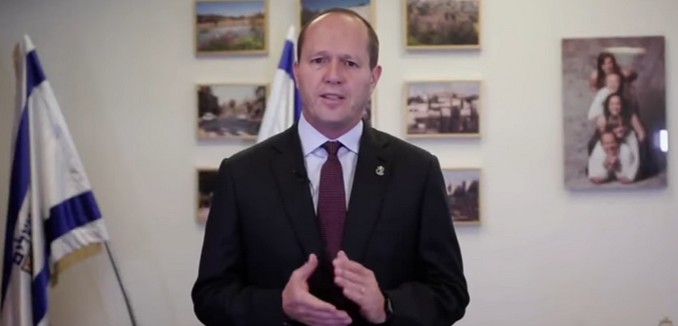The mayor of Jerusalem announced on Monday that he is holding direct talks with members of the new U.S. administration about potentially moving the American embassy to the Israeli capital, describing his interlocutors as “serious about their intention.”
Mayor Nir Barkat noted in a statement that the Trump administration’s interest in relocating the embassy from Tel Aviv sends “a clear message to the world that the United States recognizes Jerusalem as the undivided capital of Israel.”
“We’ll help the U.S. government use its authority [and provide] all the necessary assistance to make the [relocation] of the embassy to Jerusalem as quickly and smoothly as possible,” Barkat said.
“I am holding talks with government officials in the U.S. and I know that they are serious about their intention,” Barkat added in an interview with Army Radio. “They have various properties in Jerusalem that could serve as a solution.”
The Trump administration indicated on Sunday that discussions over the embassy move are currently in their preliminary stages.
Israel declared Jerusalem as its capital in 1949, shortly after its independence. Its legislature, Supreme Court, and executive government offices are all located there, as are the president’s and prime minister’s official residences.
U.S. law has required the relocation of the embassy to Jerusalem since the Clinton era. Congress adopted the Jerusalem Embassy Act in 1995 with overwhelming bipartisan majorities in both houses, requiring that the American embassy be moved to Jerusalem by May 31, 1999. The legislation, which notes that “each sovereign nation, under international law and custom, may designate its own capital,” acknowledges that Jerusalem has served as Israel’s capital since 1950 and asserts that it should remain an undivided city.
However, all presidents have opted to waive that order for six-month periods since it was passed. The current waiver expires in May 2017.
Although Palestinian minister Jibril Rajoub claimed on Sunday that such a move would be tantamount to “a declaration of war against Muslims,” none of the potential embassy locations are on territory claimed by the Palestinians, but are rather on Israel’s side of the 1949 armistice agreement lines.
Following UNESCO’s passage of a resolution this past October denying the centuries-old Jewish connection to Jerusalem’s Temple Mount, Judaism’s holiest site, a bipartisan group of U.S. senators and representatives wrote a letter reaffirming congressional recognition of Jerusalem as “Israel’s eternal capital.”
This sentiment has wide support among American lawmakers, with Sen. Ben Cardin (D – Md.), currently the ranking member of the Senate Foreign Relations Committee, saying in 2010 that “Jerusalem is the undivided capital of the State of Israel.”
The passage last month of United Nations Security Council resolution 2334, which described eastern Jerusalem — where the Jewish Quarter of the Old City is located — as Palestinian territory, has provided further impetus for the embassy move. The Security Council measure was opposed by many top Democratic and Republican politicians, and praised by the Palestinian Authority, Hamas, and Palestinian Islamic Jihad.
Eugene Kontrovich, an international law expert at Northwestern University, explained earlier this month that relocating the U.S. embassy to Jerusalem would help counter the deleterious effects of resolution 2334, and that moving it “over the imaginary line across which the United Nations says Jews may not go … would be the most tangible rejection of the resolution’s ‘1967 lines’ policy.”
Self-described Israeli leftist Don Futterman similarly argued that fellow progressives in the country should support the embassy move as a means to “assert our own patriotic commitment to the uniqueness of Jerusalem in our people’s history and to our country.”
“It is one of the quirks of the ongoing appeasement of Arab countries and the Islamic world that the United States and all other nations have kept their embassies in Tel Aviv,” Futterman observed, noting that “the debate over Jerusalem has to evolve to reflect today’s reality.”
[Photo: ReasonReport / YouTube ]




